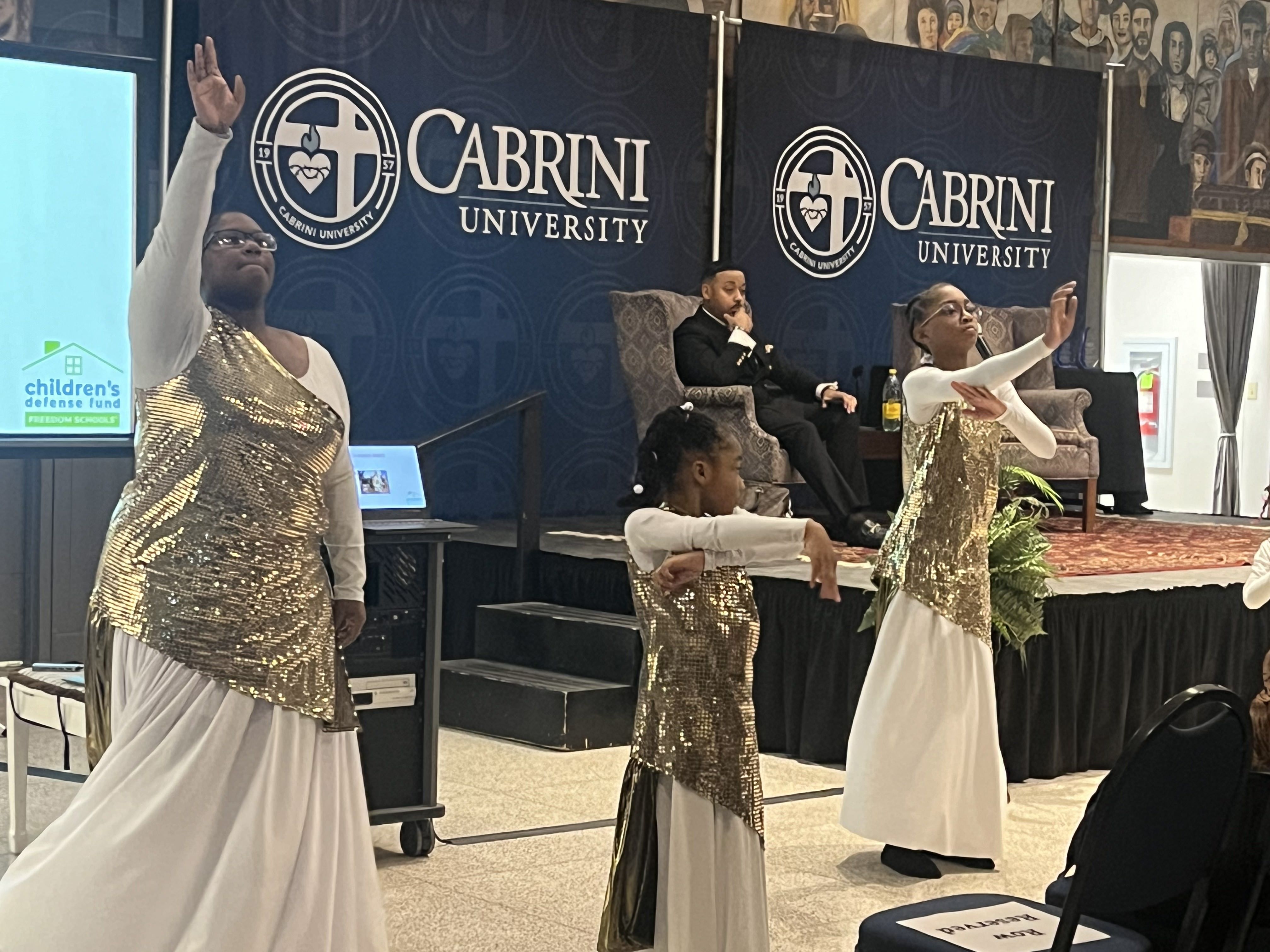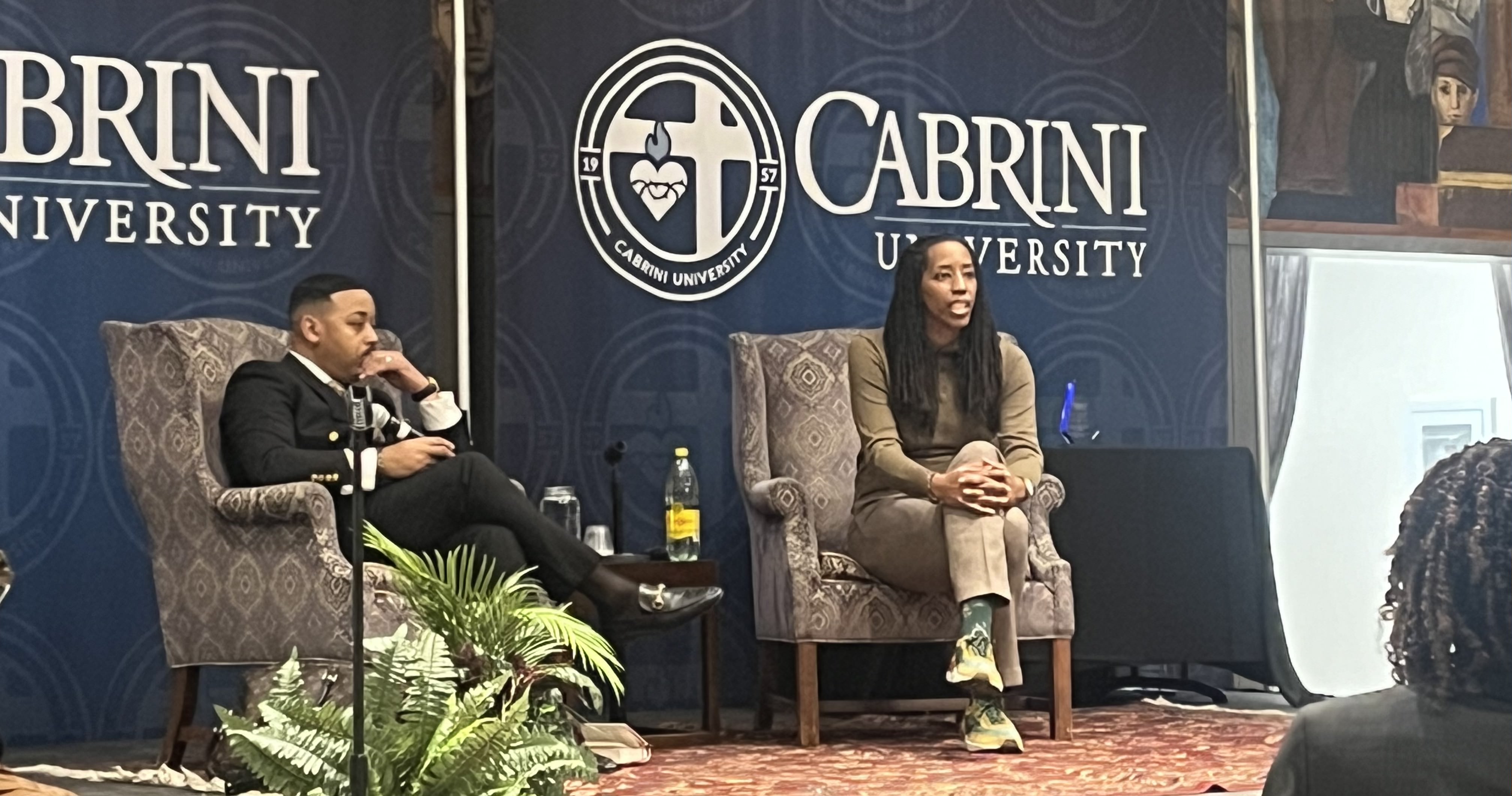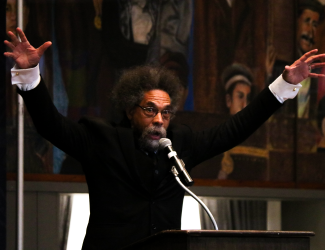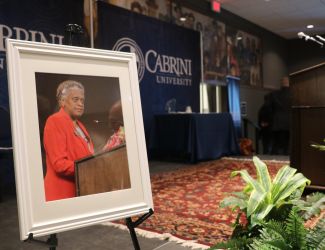Grace Hall was packed on Thursday, Feb. 15 for Cabrini’s seventh annual (and final) Shirley Dixon Celebration of Urban Education Symposium.
This year’s symposium featured a keynote presentation from Dr. Bettina L. Love. Love holds the William F. Russell Professorship at Teachers College, Columbia University and is the co-founder of the Abolitionist Teaching Network. She is currently promoting her new book, “Punished For Dreaming: How School Reform Harms Black Children and How We Heal.”
The symposium, hosted by Cabrini’s Center for Urban Education, Equity, and Improvement (CUEEI), was first held in 2017. It was founded by CUEEI director Dr. Ronald W. Whitaker II, and Cabrini Vice President of Mission, DEIB and Student Engagement Dr. Angela Campbell. ![]()
Named for and held annually in honor of the late Dr. Shirley Dixon, a professor in the education department, the symposium has featured past speakers such as author and anti-racist activist Tim Wise and activist and social critic Dr. Cornel West. Whitaker said, “We said of the symposium, ‘We need to bring in some of the leading scholars and thought leaders to challenge us about social justice and inclusivity.’”

“[Dixon] was one of the first individuals at Cabrini to really focus on urban education and making sure we treated all students fairly,” Whitaker said. “Myself and Dr. Angela Campbell decided we have to honor her. She put in so many decades in terms of being a champion and trailblazer for equitable education.”
Prior to the keynote address, students from the Children’s Defense Fund Freedom School in Wilmington, Del. performed a praise dance. An awards ceremony followed. Recipients included several members of Cabrini’s faculty: Dr. Tom Conway, Dr. Zakia Y. Gates, Dr. Angela Campbell, and Dr. Beverly Bryde. ![]()
 Dr. Love’s presentation
Dr. Love’s presentation
In her address, Love argued that educational reform and crime reform have become intertwined, and severely harmed black children over the past 40 years. She referred to children born in the 1980s and ’90s as being the main victims of racism in education.
Love cited examples such as the War on Drugs, the D.A.R.E. program, and the societal label of Black children as “crack babies” and “superpredators” as being some of the factors that have played into educational racism. She argued that much of the data from the 1980s and ’90s is skewed or misinterpreted, and used to put racist policies in place.
Love also discussed the topic of book bans in schools, and cited an article that revealed 60% of all book challenges nationwide during the 2021-22 school year came from just 11 individuals.
Speaking on the topic of Diversity, Equity, and Inclusion, or DEI, Love emphasized the point that DEI work is powerless if it has no staff, funding, or resources. She also argued that there is a difference between “allies” of racial justice and “co-conspirators.” She stated that allies are those who are supportive of racial justice but don’t take any direct action.
Love gave the example of a “co-conspirator” in a white man named James Tyson, who in 2015 assisted a Black racial justice activist named Bree Newsome in removing a Confederate flag from the South Carolina state capitol building, 10 days after Dylann Roof killed eight Black parishioners and their pastor Emanuel African Methodist Episcopal Church in Charleston, S.C.
While Newsome scaled the flagpole, Tyson held onto it after police threatened to use their Tasers on Newsome, so that if they did, Tyson would be electrocuted as well. Both were arrested immediately upon Newsome’s return to the ground.
Concluding her presentation, Love argued that the only way to heal racism in education is through reparations. She gave a breakdown of the costs of different types of educational racism over the past 40 years, amounting to a total of $2 trillion.
Leaving a legacy
With Cabrini closing its doors at the end of the year, Whitaker spoke on the legacy of the symposium. “The work doesn’t end, it’s a new beginning,” he said. “Cabrini is closing, but I believe that not just tonight’s talk, but the last seven years become an opportunity for open doors in terms of what’s next.”








That’s all well and good, but now let’s take a closer look into how the Cabrini’s leadership treated the black and first generation immigrant employees. Cabrini’s fate was sealed when it became all boastful and pretentious talk and no action.